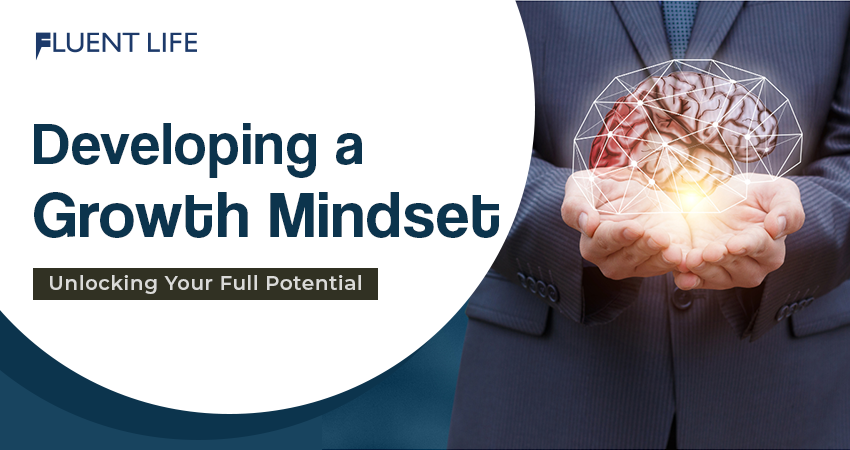Today’s world is ever-changing. To reach success, strive for personal and professional growth. You can achieve this, by developing growth mindset. It’s the belief that abilities and intelligence can be developed with effort. This is different to a fixed mindset, which sees these qualities as fixed traits.
A growth mindset means facing challenges, and seeing failures as learning opportunities. This makes people more resilient and determined to reach goals. They are also more likely to take risks, step out of their comfort zone, and push themselves.
Plus, a growth mindset helps people learn from others. It encourages them to actively seek feedback and guidance. Collaboration and continuous learning are essential for personal development.
Growth mindset is also important in the professional world. Adaptability and willingness to learn are valued by employers. With new technologies, those who can adapt will thrive.
To adopt a growth mindset, commit and dedicate yourself. Approach each day with an open mind, and surround yourself with inspiring people. Try new experiences, and reflect on yourself. It’s an ongoing process, but it unlocks full potential and inspires others.
Fear and self-doubt don’t need to hold you back. Start your journey today and never stop learning and growing. Conquer the future!
Understanding the Growth Mindset
To understand the growth mindset and maximize your potential, delve into the section “Understanding the Growth Mindset.” Discover the definition of a growth mindset and unravel the benefits it brings.
Definition of a growth mindset
A growth mindset involves believing abilities, talent, and intelligence can be developed. It’s the idea that qualities aren’t fixed, but can be cultivated. People with this mindset take on challenges, view failures as learning opportunities, and continually seek improvement.
A growth mindset means not accepting predetermined potential. Instead, abilities can be improved through practice and gaining knowledge. This mindset loves learning and looks forward to new challenges. It helps individuals overcome difficulties by seeing them as steps forward instead of blocks.
Thomas Edison’s story is a great example of the power of a growth mindset. Despite many failed attempts to invent the light bulb, he kept going. He said, “I’ve found 10,000 ways that won’t work,” showing his determination. With his never-ending pursuit of innovation, he eventually succeeded and created a world-changing invention. Edison’s story proves that a growth mindset can lead to great successes, even in tough times.
Benefits of having a growth mindset
Having a growth mindset offers many benefits! It allows people to embrace challenges, persist through difficulties, take criticism as a way to improve, and be inspired by the successes of others.
Moreover, those with a growth mindset are more adaptable to change and resilient when facing setbacks. A study in the Journal of Personality and Social Psychology shows that people with a growth mindset tend to be more successful compared to those with a fixed mindset.
The advantages of having a growth mindset are clear: It can help immensely in both personal and professional realms.
Also Read: The Role of Humor in Engaging English Conversations
Steps to Developing a Growth Mindset
To develop a growth mindset and unlock your full potential, recognize and challenge fixed mindset beliefs. Embrace challenges and seek opportunities for growth. Cultivate a positive attitude and resilience. Seek feedback and learn from mistakes. Surround yourself with a supportive environment.
Recognizing and challenging fixed mindset beliefs
Pay attention to your inner dialogue. Is it full of “I can’t do this” and “I’m not good enough“? These are clues you have a fixed mindset. Ask yourself if these beliefs are based on facts or just self-imposed limits. You can become better with effort and dedication.
Look for feedback and criticism. Don’t see it as an attack. Use it to improve. Work on developing a growth mindset. Learn from those around you who already have one. Set goals that challenge you. Celebrate small successes.
Growth mindset brings endless possibilities. Recognize and challenge fixed mindset beliefs and you’ll unlock your full potential. Don’t let fear keep you from growing. Start today and reap the rewards!
Embracing challenges and seeking opportunities for growth
Challenges show us where our limits are. We can step out of our comfort zones and gain new abilities. Growth-minded people face difficult situations, seeing them as chances to learn and progress. This helps us build resilience, flexibility, and problem-solving skills.
Seeking growth means actively seeking new experiences, information, and views. We can do this by going to workshops, reading books, or talking to others in our field. Through this, we can stay ahead and find ways to develop.
Fully embracing a growth mindset means taking on challenges and going out of our comfort zone. Thomas Edison is a great example. He kept trying despite many failures, seeing these as teaching moments. In the end, he created one of the most important inventions ever.
Cultivating a positive attitude and resilience
A growth mindset is attainable with a positive attitude and resilience. Embrace challenges and setbacks as chances to develop, not as blocks. Maintain an optimistic outlook and stay determined. Approach issues with an open mind and look for solutions. Develop the ability to persist in the face of difficulty.
Other strategies to cultivate a growth mindset include seeking feedback from others and setting achievable goals. Dr. Carol Dweck’s research at Stanford University has proven the power of a growth mindset. It results in higher accomplishment and contentment than a fixed mindset. Work towards a growth mindset to unlock true potential and succeed.
Seeking feedback and learning from mistakes
- Feedback gives outsiders’ views, which helps people learn their strengths and weaknesses.
- Constructive criticism helps identify skills and knowledge that need improvement.
- Actively asking for feedback creates a culture of continuous betterment.
- Mistakes are not failures; they’re steps on the road to success.
- Learning from mistakes builds resilience and adaptability, helping people to reach their goals.
Plus, taking feedback and learning from mistakes helps people create a growth mindset, necessary for long-term development.
In the 2000s, Steve Jobs had trouble when Apple’s products were not selling. He didn’t give up though; he asked customers for feedback and tried to make Apple’s products better. Thanks to this dedication to learning from mistakes, he created world-changing products like the iPod and iPhone. Seeking feedback and learning from mistakes were essential to Steve Jobs’ success.
Surrounding oneself with a supportive environment
- Seek mentors who have already achieved success. Their guidance and insights will aid you.
- Create a community with like-minded individuals to provide support. This will inspire you to strive for improvement.
- Eliminate negative influences. Stay away from those who discourage or undermine your aspirations. Regularly evaluate your social circle. Get rid of toxic influences.
- Nurture relationships that foster growth. Do this to develop a growth mindset.
Also Read: Conversational Etiquette Tips: Do’s and Don’ts in English
Applying the Growth Mindset in Daily Life
To apply the growth mindset in daily life, unlock your full potential by setting and achieving personal goals, overcoming obstacles and setbacks, developing new skills and abilities, and fostering a growth mindset in others. These sub-sections provide solutions to maximize your growth and embrace a mindset that fuels continuous improvement.
Setting and achieving personal goals
- Identify your goals. Take time to think of what you really want. Is it a job promotion? Being healthier? Or learning something new? Be exact.
- Divide those goals into smaller chunks. This’ll make the process easier and make it simpler to monitor your progress.
- Make a plan. Write out the steps needed and give each one a deadline. Prioritize too, depending on their importance and urgency.
- Start taking action, but stay open-minded. You may have setbacks, but see them as learning opportunities.
- It needs dedication, perseverance, and flexibility. To stay motivated, celebrate little successes. Get help from people who can give guidance and encouragement.
- Caroline Dweck’s Stanford University study found that those with a growth mindset take on challenges and struggle through problems better than those with a fixed mindset.
Overcoming obstacles and setbacks
A growth mindset is essential for success! To incorporate this into daily life, do the following:
- Face obstacles head-on & see them as opportunities for growth.
- Maintain a positive attitude & adapt to change.
- Break down larger goals into smaller, achievable steps.
- Seek help from mentors & peers.
Strive for continuous improvement. Don’t let fear of failure hold you back. Join the movement towards self-improvement today!
Developing new skills and abilities
Setting clear goals is key for skill development. A growth mindset means learning is a life-long process. Seek feedback to identify areas that need improvement. Embrace challenges to foster personal growth. Employ proven techniques to become more efficient. Dedicate, persist and be patient; it’s the only way to overcome obstacles.
Stay on top of trends and advancements in your field. Self-reflect and assess progress regularly.
Take Thomas Edison’s example: he failed numerous times before inventing the electric light bulb. He kept experimenting and refining his approach until success. His dedication shows the importance of embracing challenges and having a growth mindset.
Fostering a growth mindset in others
Fostering a growth mindset in others starts with creating an environment that promotes learning and growth. This can be done by providing helpful feedback, stressing effort over innate abilities and celebrating mistakes as learning opportunities.
High expectations must also be set. When people believe they can do great things, they are more likely to put in effort and persist despite difficulties. Encouraging goal-setting and offering support can fuel their belief and motivate them.
It is also important to promote a culture of improvement. By recognizing progress and small achievements, individuals are motivated to keep pushing themselves. Encourage them to take on tasks outside their comfort zones to help develop their growth mindset.
According to research by psychologist Carol Dweck, individuals with a growth mindset are more likely to achieve their goals and overcome obstacles compared to those with a fixed mindset.
Also Read: Master the Art of Small Talk: Engaging Conversation Tips
Conclusion
Developing a Growth Mindset is a process that enables individuals to reach their highest potential and succeed. With this mindset, one can develop qualities like resilience, persistence, and flexibility; all essential for individual and professional progress. This mindset helps people face challenges, gain from mistakes, and keep improving.
To develop a growth mindset, set realistic goals, and break them into achievable parts. This helps people stay focused and inspired while working to reach objectives. Request feedback from others and be open to new perspectives for insights that can support personal development.
Another great strategy is to take failure as a chance for growth rather than a problem. Failure teaches us about our strengths and weaknesses. By viewing failures as learning experiences, individuals become more motivated and persistent in their pursuit of success.
Surrounding oneself with like-minded individuals who have similar ambitions is also helpful. Talking with these people creates a collaborative, supportive environment for learning. It also provides networking and knowledge-sharing opportunities, which can lead to fresh ideas.
In addition to the strategies above, developing a growth mindset requires commitment and self-reflection. Taking time to identify areas of improvement and actively looking for chances for personal growth allows individuals to keep pushing boundaries and reach their full potential. Know More – The Fluent Life
Frequently Asked Questions
Q 1: What is a growth mindset?
A. A growth mindset is the belief that abilities and intelligence can be developed through dedication, hard work, and determination. It promotes the idea that individuals can improve their skills and achieve their goals by continuously learning and embracing challenges.
Q 2: What are the benefits of developing a growth mindset?
A. Developing a growth mindset empowers individuals to overcome obstacles, embrace failures as learning opportunities, and persist in the face of setbacks. It enhances motivation, creativity, and resilience, leading to personal and professional growth, increased productivity, and improved overall well-being.
Q 3: How can I develop a growth mindset?
A. To develop a growth mindset, it is essential to embrace challenges, view failures as stepping stones to success, value effort and persistence, seek feedback and learn from it, and surround yourself with positive and supportive individuals. Additionally, cultivating a love for learning and maintaining a growth-oriented perspective can contribute to developing this mindset.
Q 4: Can anyone develop a growth mindset?
A. Yes, anyone can develop a growth mindset. It is not limited by age, intelligence, or background. It is a skill that can be nurtured and strengthened with practice and self-reflection. By consistently adopting the principles of a growth mindset, individuals can unlock their full potential and achieve personal and professional success.
Q 5: How does a growth mindset impact personal and professional growth?
A. A growth mindset fosters continuous learning, adaptability, and resilience. It encourages individuals to take on challenges, learn from failures, and continuously improve themselves. This mindset helps individuals overcome self-limiting beliefs, boosts confidence, and promotes a positive attitude towards development. As a result, personal and professional growth is accelerated, leading to increased opportunities and success.
Q 6: Can a growth mindset be developed in a team or organization?
A. Absolutely. Developing a growth mindset within a team or organization can create a culture of learning, collaboration, and innovation. By promoting continuous improvement, providing opportunities for skill development, and fostering a supportive environment, the collective potential of the team or organization can be unlocked, leading to enhanced performance and success.






